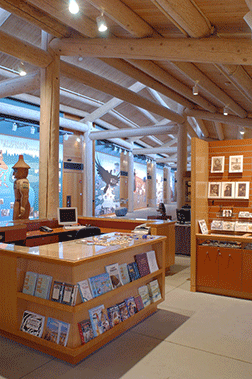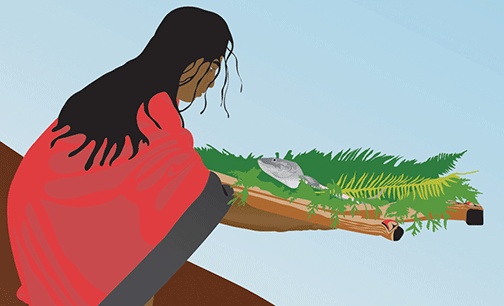Squaxin Island Tribe Museum Library and Research Center
Tribal elders have always taught the young people to respect nature’s gifts, to take only what they need and use all that they take. Tribal people depend on these gifts for food, trade, culture and survival. We have a unique relationship with natural resources and a deep understanding of the sciences, such as precise knowledge of ocean currents and tides, weather patterns and changes, natural medicines, marine biology and even engineering, as evidenced by complex fishing structures and equipment. Many tribal members continue to make their livelihood through salmon, geoduck and clam fisheries.
The strong connection between the seven inlets of South Puget Sound and the Squaxin Island Tribe – People of the Water – is the core theme that is presented in all exhibits and galleries throughout the MLRC. As a living eco-museum, the MLRC shows how nature and Squaxin Island Tribal culture relate. Key topics, such as our prehistoric and present day aquatics-centered lifestyles, timber/wild game harvest and management techniques, oral history and legends, the Treaty of Medicine Creek, religious practices and arts, all highlight this link with nature and the inland sea.
The Squaxin Island Museum Library and Research Center (MLRC) tells the story of the People of the Water through a series of exhibits and displays depicting the relationship between Squaxin Island Tribal members and the seven inlets of South Puget Sound. You may also experience our rich culture by participating in cultural activities and special events.
The hopes and dreams of our elders and those who have walked before us have come true through this magnificent facility. Our culture, past and present, is preserved for people of all generations. With a small, yet highly professional staff, the MLRC presents exhibits, lectures, films, tours, traditional skills workshops and educational outreach programs for students in local schools.
The MLRC also features a public library and a specialty gift shop specializing in Squaxin Island and other Native American art and literature.
MLRC Features
- The immense Hall of the Seven Inlets
- An exhibit featuring cultural items recovered from an ancient fishing site
- Guided tours by appointment
- Storytelling circle
- Museum book store/gift shop
- Wheelchair accessible
A Connection with the Burke Museum
The Squaxin Island Museum Library and Research Center is pleased to associate and collaborate with the Burke Museum of Natural History and Culture at the University of Washington in Seattle. The Burke is a regional museum and the oldest public museum in Washington, and it’s support of the Squaxin Island project is more than welcome. Burke Museum staff provide exchanges of information and assisted in developing the facility and its exhibits and programs. The Burke shares artifacts and displays from its collection of four million historical objects.
Partnerships have also been established with the Washington State Historical Society Museum, the National Museum of the American Indian and the Smithsonian Institute to receive technical assistance, host traveling exhibits, develop joint programming and obtain artifact loans pertaining to the Squaxin Island Tribe.
“This museum contributes to the life of the whole state, the whole nation and everywhere in the world where people believe it is important to share heritage, past, present and future. This is an incredibly important facility.”
– Dr. James Nason, former Professor of Anthropology and Curator of New World Ethnology, University of Washington’s Burke Museum
Education
The Squaxin Island Tribe believes that well rounded education is the key to a strong community. The MLRC is a center for learning in much the same way that intertribal trade sites drew our ancestors to one central location to learn and share knowledge about everything from bartering and trade to marine biology and harvest techniques.
Tribal staff work closely with local schools, which have indicated their strong support for the MLRC. It is viewed as a positive move toward enhancing educational opportunities, particularly those dealing with Pacific Northwest history, the sciences and an understanding of Squaxin Island culture.
With a small, yet highly professional staff, the MLRC presents exhibits, lectures, films, tours, traditional skills workshops and educational outreach programs for students in local schools.
Educational programs include storytelling series, language instruction, cultural classes, research projects and traditional activities such as basketweaving and carving.
The MLRC is a place for researching current issues as well as history. It is a gateway to a wide range of educational information including exhibits, tribal legends, family trees, artifacts, contemporary works of art, a large variety of books, tribal documents, audio and video programming and internet services.
Cultural Activities
Squaxin Island Tribal culture is a reflection of the strong relationship between tribal members and the vast resources of the land and sea, and is alive with creative expressions such as basketweaving, carving and drumming.
Annual events include the First Salmon Ceremony and the Sqwi’ Gwi, which recognizes and honors students for their educational achievements. The Tribe also supports a button robe project that provides Native American high school graduates with traditional blankets. Language restoration and preservation is a main priority. An intertribal drum group based at Squaxin Island strives to preserve and enhance tribal culture through its West Coast and Coast Salish music and potlatch protocol. The drum group focuses on youth and educational programs.
“This museum is the heart of our community.”
– Rhonda Foster, Director of the Cultural Resources Department“I am delighted to be part of this project!”
– Ralph Munro, Secretary of State 1980 – 2001
The Squaxin Island Tribe Museum Library and Research Center is a 501(c)(3) non-profit organization.


Pingback: Squaxin Island tribe museum | Coast Salish
Pingback: #7: Salmon |
Pingback: #7: Salmon |